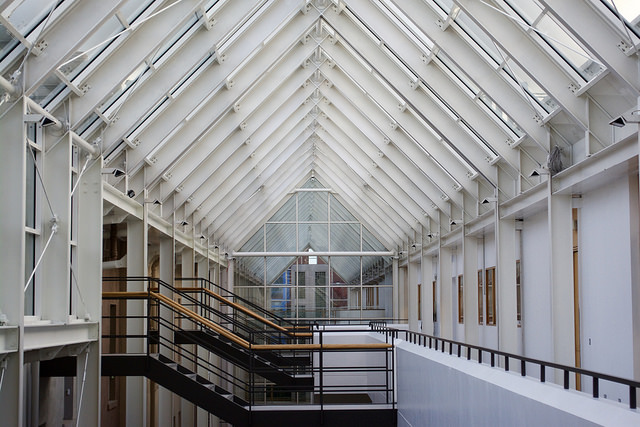Trinity students have condemned College for the timing of its demolition of the biochemistry building and Robert’s Laboratory near the Hamilton, labelling “selfish and inconsiderate” a decision that one student said has made the Hamilton library “a place not conducive to effective studying”.
The demolition is taking place ahead of the construction of College’s landmark Engineering, Energy and Emerging Technologies (E3) Institute.
Students have complained that the noise levels coming from the site have made it difficult to study in the Hamilton library, and have impacted the air purity in the surrounding area.
In an email statement to The University Times, engineering, maths and science (EMS) convenor Daniel O’Reilly said that the work is “causing a lot of disruption to students by way of how much noise is inherent in demolition works”.
He said: “It’s turned the Hamilton library – the primary study space for a lot of EMS students and, for most of us, the only place to access the books in our field – into a place not conducive to effective studying.”
Celia Hughes, a fourth-year engineering student, told The University Times in an email statement that “it’s actually pretty selfish and inconsiderate” for College to schedule these works at such a busy time in the academic year.
“To expect students to study through that kind of disruption is extremely inconsiderate, but then to say that the noise will be at ‘acceptable’ levels baffles me. On top of that, they say that they will control the amount of debris going into the air, but they’re demolishing a building and air impurity clearly cannot be prevented”, Hughes said.
She continued: “To subject the entire west-end college community, not just undergraduate but postgraduate students and staff, is absolutely crazy and it makes me extremely angry that they blatantly do not care about their own students and staff in this area.”
Deirdre O’Shea, the project manager of the demolition works, addressed students’ complaints in an email that was made available to EMS class representatives. In the email, seen by The University Times, O’Shea said: “We have pursued a number of measures to minimise noise and disruption as much as possible.”
“The building is surrounded by scaffolding on two sides to protect the east end buildings from dust and to help insulate the site noise”, she added.
O’Shea also stated that workers are using “the least disruptive of options open to us” and have been carrying out noisy work outside of normal working hours.
“Appreciating the students can be more sensitive to noise disruption at exam time, we scheduled the noisier elements of work to avoid this”, O’Shea wrote. However, she said that there “are no guarantees of course” and that “things can happen on site that can cause delays and change the programme”.
She said: “The final week of November is a concern and this is something I will look at when we see how things are progressing and can appreciate better the impact on the library.”
O’Reilly has been added to the key stakeholders group by O’Shea, in order to provide students with updates on developments concerning the demolition work.
But O’Reilly said this move “only raises the question why the College didn’t consider the students to be the key stakeholders in the project already, especially when they are the ones who decided to schedule these demolition works at such an inconsiderate time and not during the four months a year when students aren’t submitting assignments or preparing for exams”.
It is hoped that the E3 institute, which has drawn national attention and praise for its modern multidisciplinary approach, will be built by 2022.
In May 2018, Trinity launched its plan for the institute, announcing that the project had won the support of prominent philanthropist Martin Naughton, who gave the country’s largest-ever private donation to E3. Speaking at the launch, Provost Patrick Prendergast stated that “the new institute will in time change how society solves the many challenges that the world faces. E3 is something new, and not just in Ireland but internationally”.
The redevelopment of the old biochemistry building will see it remodelled to become a new on-campus teaching facility, at a cost of €60 million. The institute aims to provide over 1,800 extra places on STEM courses, with a 50 per cent increase in science student numbers and an overall student increase of 10 per cent.







